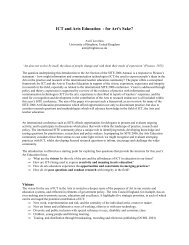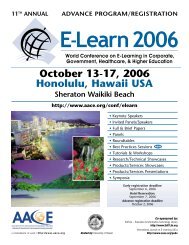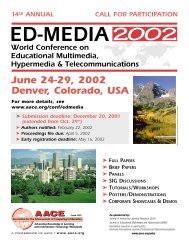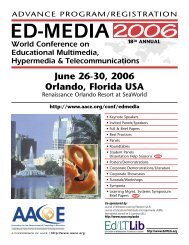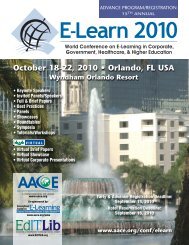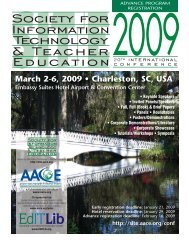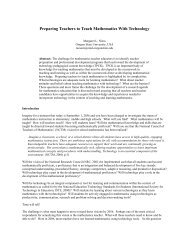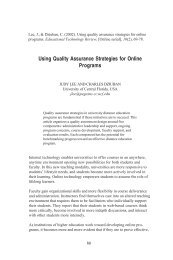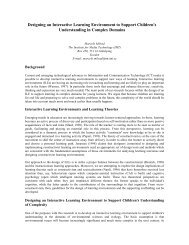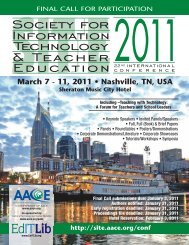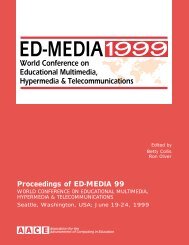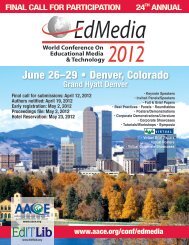June 25-29, 2007 Vancouver BC, Canada - Association for the ...
June 25-29, 2007 Vancouver BC, Canada - Association for the ...
June 25-29, 2007 Vancouver BC, Canada - Association for the ...
Create successful ePaper yourself
Turn your PDF publications into a flip-book with our unique Google optimized e-Paper software.
PRE-CONFERENCE TUTORIALS & WORKSHOPS<br />
Monday, <strong>June</strong> <strong>25</strong>, Morning, 8:30 AM – 12:00 NOON<br />
T3: Designing Training Simulations to Support Participant Attitude Change:<br />
The NPD Challenge Simulation<br />
Terry Schumacher, Rose-Hulman Institute of Technology, USA<br />
Abstract<br />
Educators designing training simulations and Au<strong>the</strong>ntic Learning Environments want<br />
to understand how design influences pedagogical effectiveness. This workshop<br />
explores a specific simulation designed to induce attitude change. The simulation<br />
addresses issues (sometimes labeled ‘Market Orientation’) encountered by entrepreneurs<br />
and engineers involved in new product development. Attitude change data<br />
will be presented to support claims of design effectiveness. The speaker will run <strong>the</strong><br />
simulation with participants viewing projected screen images and making decisions.<br />
Participants are placed in <strong>the</strong> role of an entrepreneur with an initial product vision.<br />
They move through customer interviews, trade shows, product feature selection, and<br />
customer segmentation, concluding with product launch. This simulation has been<br />
used in our graduate Marketing class and our undergraduate Entrepreneurship class<br />
and students enjoyed it. The role of fun as a design goal is also addressed in a discussion<br />
of design guidelines drawn from <strong>the</strong> Constructivism literature.<br />
Objectives<br />
Participants will spend about 2 hours exploring <strong>the</strong> ‘New Product Development<br />
Challenge’ simulation. It incorporates <strong>the</strong> ‘Paired-Game’ design created in previous<br />
research (Simulation Design, Role Identification, and Attitude Change in a High<br />
Technology Culture, doctoral dissertation in Systems Science PhD program,<br />
Portland State University, 1992). After experiencing this simulation, its design elements<br />
will be discussed and mapped to reviews of <strong>the</strong> Au<strong>the</strong>ntic Learning<br />
Environments and Constructivism literatures. Participants will be presented a view<br />
of how simulation design choices can impact pedagogical effectiveness. The special<br />
challenge of achieving attitude change – as opposed to in<strong>for</strong>mation transfer -<br />
will be discussed.<br />
Outline<br />
• Simulation / Au<strong>the</strong>ntic Learning Environments design goals.<br />
• Attitude change - a special challenge in learning<br />
• Review of research on simulation & attitude change<br />
• Golas / Luca time estimates <strong>for</strong> managing multimedia projects<br />
• The Revolution Plat<strong>for</strong>m (subset of my presentation at Ed-Media 2005 which<br />
was well attended)<br />
• Features of The NPD Challenge Simulation (experience <strong>the</strong> simulation, discussion<br />
of features)<br />
• Linking simulation features to Constructivist & Au<strong>the</strong>ntic Learning<br />
Environment literatures<br />
Prerequisites<br />
This workshop requires no prerequisites. It is <strong>for</strong> those interested in developing simulations<br />
/ Au<strong>the</strong>ntic Learning Environments and will explore <strong>the</strong> presenter’s distinctions<br />
between <strong>the</strong>se. It will be useful <strong>for</strong> participants who need to evaluate <strong>the</strong> likely<br />
effectiveness of simulations (e.g., third party work).<br />
Intended Experience Level<br />
Intermediate<br />
Instructor Qualifications<br />
Dr. Schumacher built a training simulation <strong>for</strong> a high-tech company in his doctoral<br />
dissertation research. He measured significant employee attitude change following<br />
simulation use in <strong>the</strong>ir corporate training classes. He was employed <strong>for</strong> two years as<br />
a Research Fellow in Multimedia at <strong>the</strong> Open University Business School where he<br />
designed a simulation on innovation. His current project is a simulation <strong>for</strong> training<br />
virtual teams. He presented at Ed-Media in 2001, 2003, 2004 and E-Learn 2006.<br />
Tutorials are indicated by a T# and have a lecture/demonstration <strong>for</strong>mat. Workshops are indicated by a W# and are primarily hands-on sessions.<br />
We advise early registration <strong>for</strong> all Tutorials and Workshops due to limited space available.<br />
9



